‘The Fall Guy’ Writer Drew Pearce Talks That A-List Cameo and the ‘Mission: Impossible’ Death He Considered
- Oops!Something went wrong.Please try again later.
- Oops!Something went wrong.Please try again later.
- Oops!Something went wrong.Please try again later.
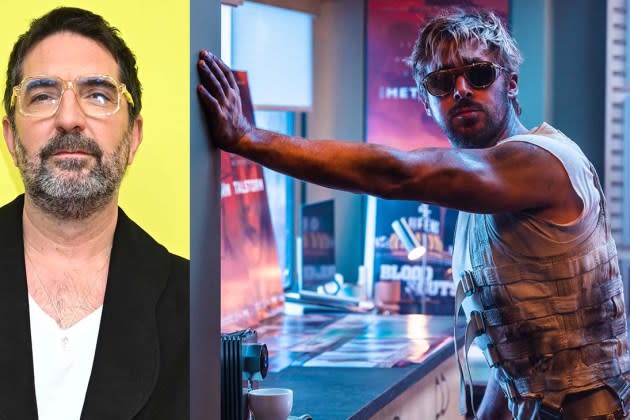
[This story contains spoilers for The Fall Guy.]
After the many industry-wide challenges of the last four years, The Fall Guy screenwriter Drew Pearce just wanted to make a feel-good Friday night movie, and based on various metrics, the consensus among critics and audiences is that he and the rest of his collaborators succeeded. In ten years, the social framing around the David Leitch-directed movie won’t be that it opened to $27.7 million instead of a projected $30 million. Rather, the impression of a good action romcom will remain above all.
More from The Hollywood Reporter
Box Office: 'Kingdom of the Planet of the Apes' Hitting Target With $52M-$56M U.S. Opening
'The Fall Guy': Five Ways in Which the Movie References the Original Series
Box Office: 'The Fall Guy' Lands With $28.5M, 'Phantom Menace' Tops 'Challengers' for No. 2
Pearce is no stranger to IP-driven films, as he’s officially written for Marvel Studios’ Iron Man 3, the fifth Mission: Impossible film, Rogue Nation, as well as the Fast & Furious spinoff, Hobbs and Shaw. That also doesn’t include all the cups of coffee he’s had with other franchises in an uncredited capacity. So, compared to the aforementioned IP, the assumption is that The Fall Guy, based on a largely forgotten ‘80s TV series, would be a walk in the park, creatively, since it doesn’t have the same expectations and same number of voices involved. However, Pearce likens his liberating experience on The Fall Guy to the film you’d least expect, Iron Man 3.
“I know that will sound surprising, but at that point, certainly as a creative team, Marvel was still just making a gigantic [John] Cassavetes movie,” Pearce tells The Hollywood Reporter. “Nobody but [director/co-wrtier] Shane [Black] and I touched a keyboard for the entire two-and-a-half years. So, naively, as my first big Hollywood job, I thought that’s how franchises work, and of course, I was disabused of that idea frequently, almost every time, in fact, over the following decade. So, The Fall Guy, though not exactly the same, had a very small group of us pushing the creative.”
In The Fall Guy, Ryan Gosling plays Colt Seavers, the titular fall guy, which is an industry term for stunt man. And when his former leading man, Tom Ryder (Aaron Taylor-Johnson), accidentally kills Colt’s replacement stunt man, Ryder and his unsavory producer Gail Meyer (Hannah Waddingham) hatch a plan to make Colt the literal fall guy. But together with his ex-girlfriend turned director, Jody Moreno (Emily Blunt), Colt captures Tom’s hot mic confession on set, leading to a last-minute recast in Metalstorm, the fictional movie within the movie that Jody is trying to rescue. The Fall Guy then closes with a scene inside San Diego Comic-Con’s Hall H, as Jody unveils the fictional trailer for her sci-fi Western that now stars Jason Momoa as the central Space Cowboy character.
“We knew that we would replace Tom Ryder in the [fictional] movie, but we didn’t know who our replacement person would be. So we just got incredibly lucky that everyone knows Jason and that he was around and available,” Pearce says. “This is a guy who, at the L.A. premiere, when he saw himself in the Space Cowboy role, he literally stood up and did the same roar in the audience that he was doing on screen.”
In 2013, on the heels of Iron Man 3’s $1.2 billion box office gross, Pearce was hired to write Mission: Impossible – Rogue Nation, and while he gives full credit to director Christopher McQuarrie and star Tom Cruise, he’s especially proud of creating an embryonic version of the character that would later become Rebecca Ferguson’s fan-favorite spy, Ilsa Faust. Unfortunately, Ilsa’s tenure with IMF came to an end in last summer’s Mission: Impossible – Dead Reckoning, and Pearce, like the rest of the audience, is heartbroken by the story point, reminding him of a death he briefly considered during the early days of Rogue Nation.
“Weirdly, killing Benji was actually something I debated at the beginning of Rogue Nation,” Pearce recalls of his experience that ultimately landed him a story credit. “Simon Pegg, if you’re reading, I apologize, but you are the easiest person to fridge in a weird way, because you have one of the longest relationships with Ethan. But I don’t think there’s a political repercussion for fridging him. It’s just an emotional one, which is what you want.”
Below, during a recent conversation with THR, Pearce also discusses the realities of being a professional screenwriter and how they, too, can be a fall guy for choices they didn’t necessarily make.
You’ve written in a number of franchises such as the MCU, Mission: Impossible and Fast and Furious, as well as others that are both known and unknown. Of course, The Fall Guy is based on an ‘80s TV series, but it’s highly unlikely that it had to contend with the same number of voices, cooks and notes as those others. It’s still a well-funded movie that isn’t going to be ignored, but was this a relatively freeing experience in comparison?
It was actually relatively similar to my very first franchise experience on Iron Man 3. I know that will sound surprising, but at that point, certainly as a creative team, Marvel was still just making a gigantic [John] Cassavetes movie. It was me, [director/co-writer] Shane Black, Kevin Feige, Robert Downey Jr. and my executive. That was it. Literally every decision and every note came from there. Of course, there was Ike [Perlmutter] and a layer of bureaucracy and notary, but at that point, Kevin was in so much control — despite the fact that it wasn’t the politic — that we did what we wanted.
So that was my first franchise movie, and it’s actually my first produced credit, I think, for a movie. And what was fascinating about that was I was the first person on and the last person out, and nobody but Shane and I touched a keyboard for the entire two-and-a-half years. So, naively, as my first big Hollywood job, I thought that’s how franchises work, and of course, I was disabused of that idea frequently, almost every time, in fact, over the following decade. So, The Fall Guy, though not exactly the same, had a very small group of us pushing the creative. We’re all at this point quite seasoned in our different filmmaking areas, and it also had that kind of blockbuster cottage industry vibe that I first tasted [on Iron Man 3].
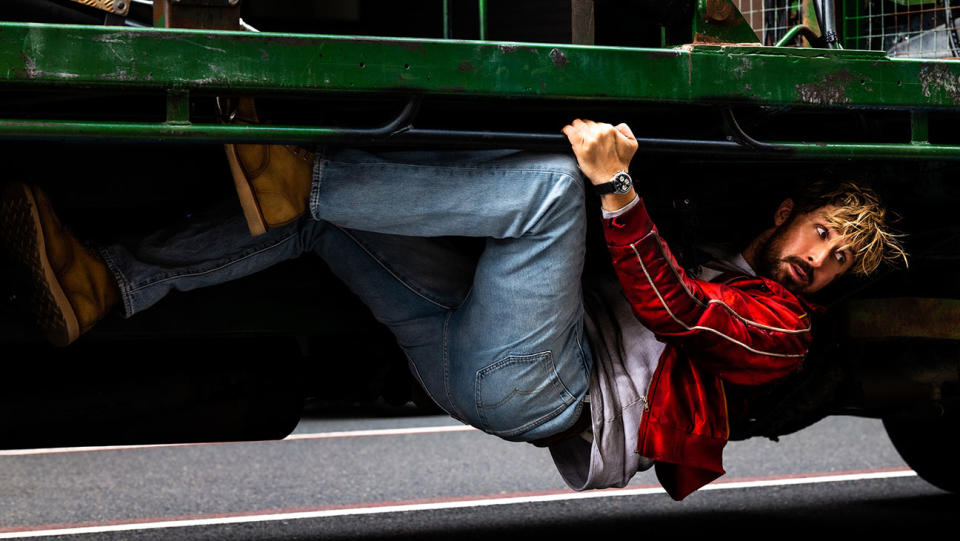
The common refrain around The Fall Guy is that it’s a love letter to the stunt community.
You heard that talking point!?
Only a few thousand times now.
(Laughs.)
But at the same time, can it be said that it’s also an indictment of movie stars who believe their own press?
I wouldn’t go that hard. I’m from England — well, Scotland, actually — but I never knew anyone in the business. So when I came here, everyone was like, “Oh no, that’s an apocryphal story. That stuff doesn’t happen.” But my experience is that literally anything that is supposedly apocryphal is absolutely commonplace. It happens not just once, but all the time, to the degree that you can think of the wildest, most apocryphal-sounding story, and it has definitely happened. Now, I’m not suggesting that anyone I’ve ever worked with has murdered their stunt double, but honestly, if that story came out, you’d be like, “Yeah, that’s probably true.” A lack of carbs is very damaging to your cognitive processing. (Laughs.) So it’s strange to be able to play in a world that is both so pushed and so ludicrous, whilst also being in the realms of feasibility.
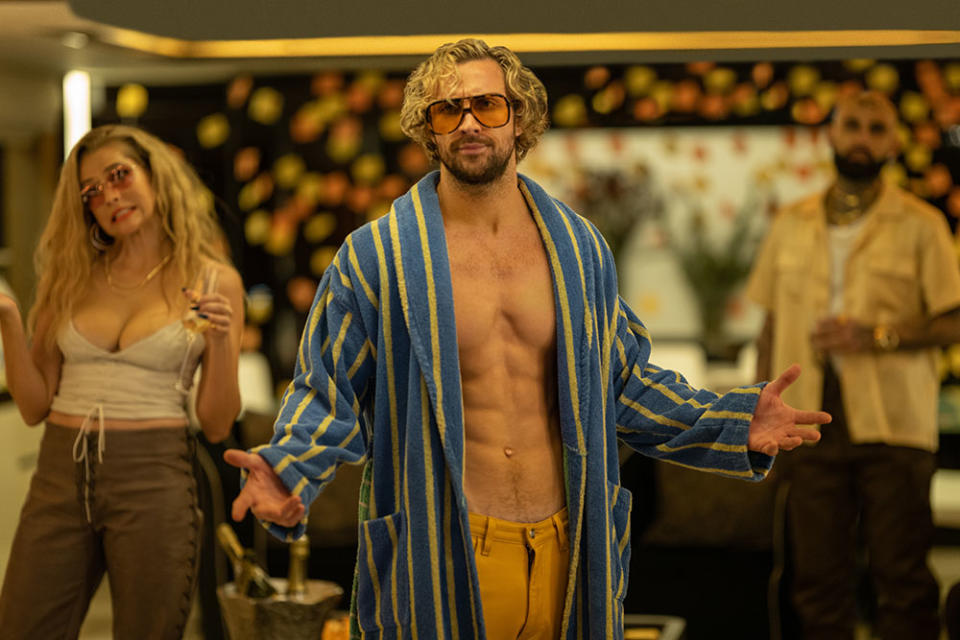
But plenty of movie stars have to uphold the narratives that surround them. They may not do it to the degree that Tom Ryder (Aaron Taylor-Johnson) does, but sticking to their own legends, as he did, often comes at the expense of someone else.
Yeah, that’s literally The Man Who Shot Liberty Valance. “Print the legend.” Movies, in general, are all a game of believe, and ours is a tricky game of believe. We are going to tell you that stunt people are the people behind the movie stars that you watch, but then we’re going to ask you to enjoy a movie star movie and expect to feel the danger that Ryan Gosling himself might be in. It sounds simple, but cognitively, that’s actually kind of a trick. It’s reflective of the entire process of filmmaking, and of course, that applies to the meta narratives of who any given actor is and how they should be received by the public. Honestly, that’s a tradition as long as Hollywood itself, and we’re now in a different version of it. We’re in a version where you have to communicate to people two generations below you through your TikTok performance, rather than through a weekly gossip rag in the ‘40s. But it’s all still a game of believe.
The Fall Guy reminded me a bit of Last Action Hero. They’re partially about the making of action movies, and reality collides with the fictional world in both stories. I also bring it up because I spoke to Scott Waugh last year, and he, like Dave Leitch, is a former stuntman turned director. Moreover, Scott did some stunts for Last Action Hero, while his stuntman father, Fred Waugh, directed second unit. Scott then told me that his father was blamed for that film going over budget, and he said something that really struck a chord: “It made me aware of how quickly a fall guy can become the fall guy.” And that’s literally the plot of your movie.
Totally!
So you normally hear about directors being turned into scapegoats, but how often does it happen to below-the-line folks?
All the time! It doesn’t usually happen in the supersized way of this movie, but below-the-line crew are fired the whole time. And that is because a blood sacrifice is required by somebody above the line, whoever that is: producorial, directorial, but seldom the screenwriter. Not enough power to hire and fire. So I definitely think that is a part of the process, and of course, in the case of a stunt guy or woman, the double jeopardy of it is this whole thing of like, “Oh, and someone could get hurt.” It’s not ephemeral; it’s tangible. And weirdly, that was actually my in to this movie. Strangely enough, the very first day I was thinking about it, I was looking at the title and I was like, “Oh, what if I hid the twist of the movie in plain sight by Trojan horsing the twist through the title?” So, weirdly, it kind of announced itself through the nature of the IP’s name.
A lot of the talk around the movie is the metaness and how it’s about show business and all of those things. But honestly, the thing that I thought worked about this idea of an unknown stuntman is the flip of that, which is the universality of the world that we move through where the unseen carry the can for the one percent literally the whole time. It is our culture. It is capitalism. (Laughs.) It is everything, right? I don’t mean to sound grandiose about that, but I miss blue-collar heroes. The action genre is one that has always reveled in that, and it’s also part of my job. A movie like this needs an underdog at its center, and at its center, I also have the most handsome and funny man in the world. So I had to put a bit of shoe leather into it to get him to the point of feeling like an underdog, and so all of that is in the soup, frankly.
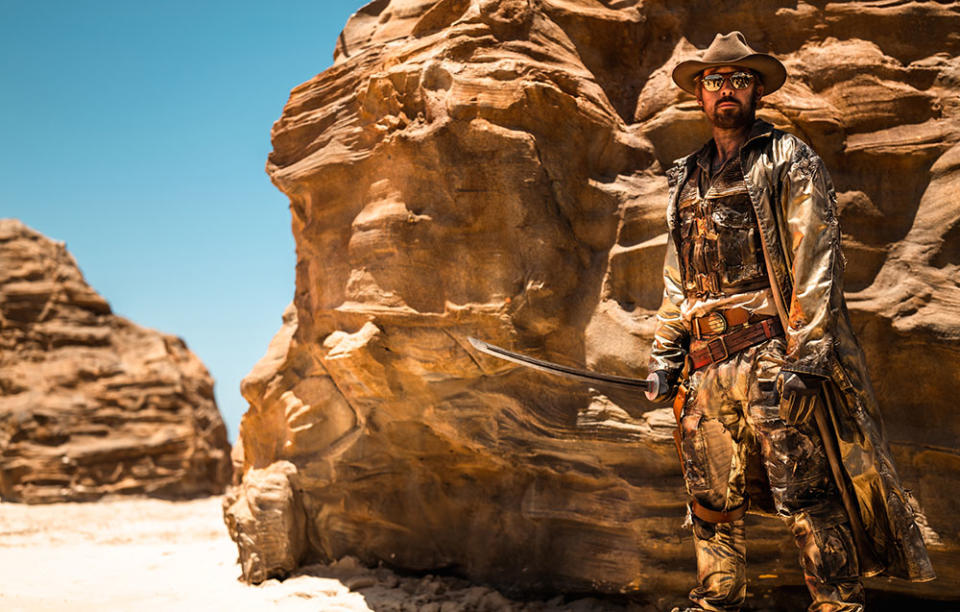
I’ve bumped up against the spelling of Jason Momoa’s last name on plenty of occasions, and that post-it note gave me a highly relatable laugh. I also appreciated that it set up his cameo as the ultimate star of Metalstorm.
Double duty. That’s what you want to be doing.
Did Jody (Emily Blunt) basically pull a Christophher Plummer and reshoot all of Tom’s scenes?
Well, it’s really funny, because originally in the script, there wasn’t a facial replacement element to the setup [that replaces Tom’s face with Colt’s on the incriminating cell phone video]. And so, at the end, Jody used facial replacement to take Tom out of the movie. But we never call it that now because we utilized facial replacement as part of the villain plot. So it felt a wee bit disingenuous to then make it part of the win, and so I like to think that it’s just excellent Christopher Plummer green screening.
Given that your third act was in flux, did you still have the shape of the ending?
The third act was always in flux, but it was the moves that were in flux. From the very first draft, we all knew that this movie ended with Colt and Jody pulling donuts in the Jeep on a beach and getting a cocktail. We also all knew that the Metalstorm trailer reveal, which originally was called Star Fall, would be a part of how we ended the movie. The moves that changed were more about the antagonist and the real world stakes and how high that needed to go. Jody’s involvement also increased so much more once you land Emily Blunt and the movie essentially becomes a two-hander.
Did you guys just happen to catch Momoa while he was also in Australia for Aquaman 2?
We knew that we would replace Tom Ryder in the movie, but we didn’t know who our replacement person would be. So we just got incredibly lucky that everyone knows Jason and that he was around and available. He was happy and excited to do it. In the same way that people get vitamin B shots, Jason is a human vitamin B shot. This is a guy who, at the L.A. premiere, when he saw himself in the Space Cowboy role, he literally stood up and did the same roar in the audience that he was doing on screen.
As much as that’s great as a gag, and it’s also cool that we have Momoa, there’s something really interesting about it. Our fake A-list star is an asshole and a murderer, but the real A-list star that we use to save Jody’s movie is absolutely an angel. By the way, I also like the fact that Metalstorm is actually an old piece of Universal IP that has nothing to do with the Metalstorm that Jody makes, and I like that it reflects the process of how we use IP in our movie.
But honestly, the thing that I love most about the movie is that it’s the best romcom I’ve seen in years, and that has nothing to do with me. I can safely say that it’s because of Ryan, Emily and their full Billy Wilder-level expertise in the genre.
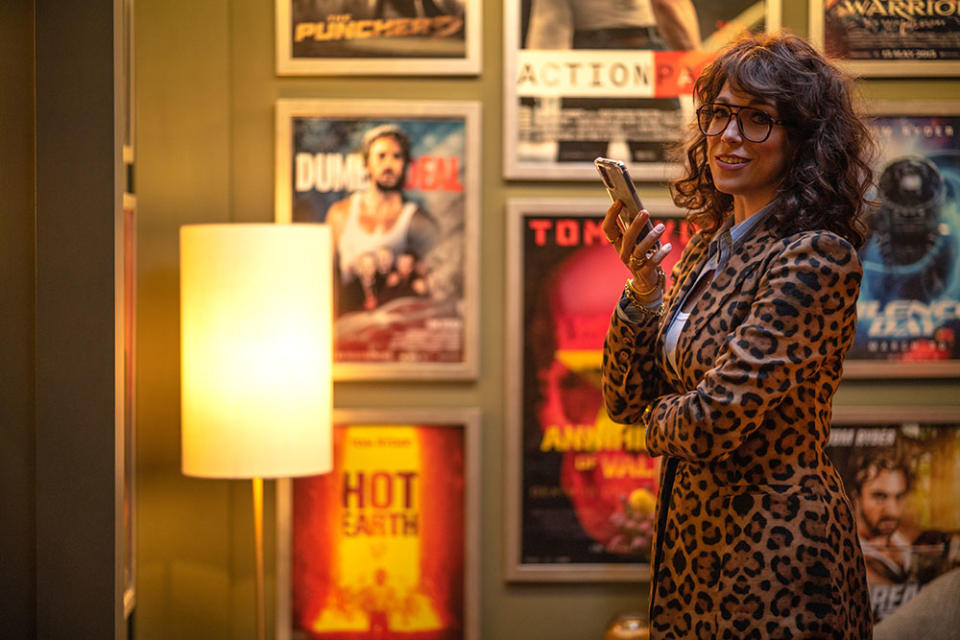
The villainous and utterly despicable producer character of Gail Meyer (Hannah Waddingham) cracks a joke that you guys have gotten some grief over. On its own, domestic violence is obviously no laughing matter, but does the context of who’s saying the joke count for something? Shouldn’t it?
No decent human being would ever make a joke about that subject, and Gail’s character is clearly not a decent human being. She’s our villain, and she says horrible things, and this is just one of them. But just like what I hope continues to happen in our industry and others, Gail is ultimately held accountable for her worldview and her behavior.
As with all of our characters, Gail included, we wanted them to feel authentic, warts and all. Sometimes shitty people say shitty things, but a character’s opinion in a movie is not the same as the perspective of either the film or the people making it. All of that being said, when a filmmaker puts a line in a movie, they have to anticipate how it will make the audience feel, so everybody is entitled to their reaction too.
I’ve never been comfortable with critiquing a script after merely watching a movie, but it’s a pretty common practice nowadays among critics. In my case, I have no idea what the original script looked like, nor do I know how much it changed during filming and editing. As a screenwriter, is it often frustrating when the script is critiqued without anyone actually reading the script that got the greenlight?
In situations where you are being criticized for something that maybe didn’t come from you, then that can be tough. But I would also say there are loads of times where you might get credited for a line that you didn’t write because it’s really fucking great. So there’s a part of me that believes that, at least in the short term, it’s a part of the process. But it is weird, specifically for a screenwriter, for the simple fact that it looks authorial, even though the process of making a movie in no way is ever based on an authorial voice of the screenwriter, even mostly with writer-directors. The nature of a movie’s voice is so director-led, so actor-led, as well as whoever’s at the laptop as well. So I try not to be frustrated by it.
You hear about trilogies not having detailed plans or productions beginning without a third act, and then when a movie doesn’t connect, fans are critical over the lack of a rigid plan. But when last-minute adjustments work out, it’s rarely addressed to that degree. Some of the most defining moments in film were from listening to the movie and following its lead. So why was it necessary for The Fall Guy to also begin shooting with some missing pieces?
Honestly, I don’t think you’re making a movie right if you don’t listen to the movie, and that’s actually the specific phrase I always use. I never quote my own lines, but there is one line in Hotel Artemis that I always come back to. It is ostensibly about bank robbery in that film, but I do think it applies to moviemaking: “You work with what you got, not what you hoped for.” In reality, for a movie, the joy of it is that everything’s a blueprint. Everything’s a plan. Your ideas, your characters, your themes, hopefully all of that stays in there, but until you’re on a location, until you know exactly what you’re doing that day on set, who the people are, who the day players are, what the light is like, you need to listen to what you’ve got every day.
Emily shows up on set, and the chemistry in a two-shot is just absolutely fantastic. So let me see if I can crowbar in some other reason that we can get them to bump into each other in the second act so that I can get some more of that stuff on screen. Of course, you need a draft that gets you greenlit, and then you need a draft that gets everyone onto set and everyone in the same direction. But once you are there, it’s your job to listen to all the component parts together and create the film. If you have the luxury to do it, continue to create the film that the component parts are pushing you towards.
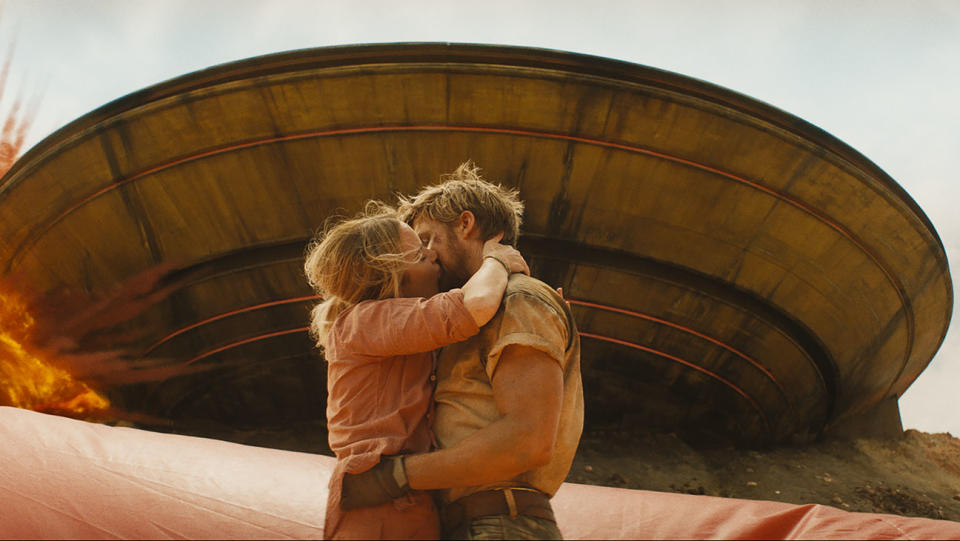
Late in the game, a gun is pulled on the dog, Jean-Claude. Did Dave suggest that as a nod to the story point that launched his directorial career via John Wick?
That actually speaks to some of the specific stuff from Dave’s life that I wanted to jam into the movie. Other than Dave Bautista, who I also work with, [Dave Leitch] is maybe the biggest dog lover in the world. He adores his dogs.
One of the genius idiosyncrasies of Shane Black happened when I was working on Iron Man 3. There’s a sequence in Iron Man 3 where Air Force One blows out and a whole bunch of people fall out of the back. We called it the “Barrel of Monkeys” sequence, and Iron Man has to somehow save all of them. I pitched it to him, and Shane was like, “I just don’t care about it.” And I was like, “But the President and everyone are blown out of the back of a plane. It’s an impossible situation.” And then he was like, “Give me one second … Oh, that is sad.” And I was like, “What did you do there?” And he was like, “I just imagined all the humans were dogs, because I don’t really like humans, but I love dogs.” And I thought, “God, if you blew 18 dogs out of the back of a plane, that would be a tragedy.” So, apparently, dog jeopardy is simply something that will follow me through my entire career path.
The beginning includes stunt footage from some of Dave’s and/or 87North’s movies like Atomic Blonde, Hobbs and Shaw and Nobody, as well as Universal movies like The Rundown, Jurassic World Dominion and Fast Five. Did you script any of these, or was it always TBD depending on clearances?
It was TBD, and that was actually a late edition sequence to the movie. I like it, but I also really loved when we just dropped straight in on the oner. There was always a version of that oner in the script. The great Peter O’Toole movie, The Stunt Man, was one of my influences on this film, and it starts with an incredible oner around a movie set that’s based at the Hotel del Coronado down in San Diego. Halfway through it, they go up on a cherry picker crane, but the camera gets on it with them. The crane then lifts them up as they keep talking. So that’s exactly what happens in our film, so I absolutely loved that. I also think it’s testimony to Ryan and Emily, but also Dave’s direction that you stay in that scene. The best kind of oner is the oner that doesn’t announce itself. It’s the oner where you don’t even realize that’s what you’re watching.
It also reminded me of Ryan’s oner at the beginning of The Place Beyond the Pines. He’s again called to “set” from his trailer, only it’s a traveling carnival.
100 percent. And in a movie that deals with Hollywood, the most classic opening oner of all is The Player. A double bill of The Player and The Stunt Man is a really fucking great night.
I’m only bringing this up because you’re drinking a cup of coffee right now, but all Colt wants is a cup of coffee at the start of the film, and he’s repeatedly denied it. Was there a deleted scene where he actually got a cup in the end?
There’s a double beverage issue that occurs in the movie. The spicy marg and the coffee are both beverage-based MacGuffins, and at some point, one of those beverage MacGuffins has to be the victor. And the love story should always trump everything else in this film, so spicy margs beat cups of coffees as the symbolic victory of Ryan’s character.
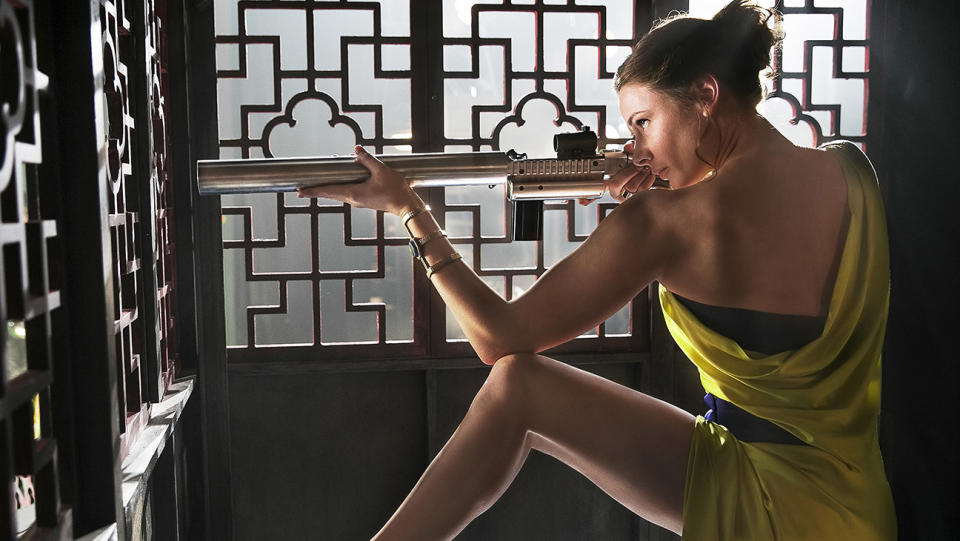
I can’t let you go without forcing Mission: Impossible – Rogue Nation into the conversation, and while I believe Ilsa Faust (Rebecca Ferguson) was invented after your tenure on the film, I’m still in grief over her recent death in Dead Reckoning.
There was a version of her, but she wasn’t the Ilsa that’s in the final version. By the way, do we think she is the death that is to be reckoned with? I didn’t think so the first time I watched the movie, but then I was like, “Maybe …” Ilsa is, for me, the greatest back-half edition to the Mission movies.
100 percent. She’s actually my favorite character in the franchise.
She’s untouchable. What’s been so good about watching the Dune movies is seeing Rebecca really start to get the recognition that she deserves. In a weird way, she didn’t off of Rogue, but listen, it’s the brave move in Dead Reckoning. You’re like, “Fuck, I’m going to miss her.” Weirdly, killing Benji [Simon Pegg] was actually something I debated at the beginning of Rogue Nation. Simon Pegg, if you’re reading, I apologize, but you are the easiest person to fridge in a weird way, because you have one of the longest relationships with Ethan. But I don’t think there’s a political repercussion for fridging him. It’s just an emotional one, which is what you want.
Franchise movies take a village, but given that you have story credit, how much ownership do you feel over Rogue?
I don’t feel any ownership over Rogue. In general — maybe beyond the director or lead, but actually across the board — I do think it’s slightly undignified when people land grab for ownership of sections of movies. And that’s one of the things that The Fall Guy is about. As you say, it does take a village, and everybody is in the pot. So that’s one of the great things about this movie’s much-wanted celebration of stunt work. Part of the community is getting recognition when they normally don’t. But there aren’t many moments of affirmation from doing any of our jobs either. Most scripts never get made. Movies never are hits if they happen at all. So you have to keep some pieces that remind you of why you do your job.
We’re in my office now, and there’s a wall of stuff behind me. So I’ll keep a piece of concept art from one of the sequences that meant a lot to me. There’s a few for Iron Man 3, but the one that you can see is when they park their suits next to all the bikes outside Neptune’s Net on the Pacific Coast Highway. That whole scene is there because I had just moved to Los Angeles, and for some bizarre reason, I took my 1-year-old child to a biker bar.
As one does …
As one does! So it has a really personal connection. The other piece of concept art that I’m pointing at is the underwater sequence from Rogue, and it’s one of my favorite action sequences where I’ve been a part of its creative genesis. I know where the napkin is from when I first had the idea. So that isn’t to land grab that, because the [final] sequence isn’t what I wrote. But that movie is the pure Cruise-McQuarrie mind meld, and I was just happy to be along for my bit of the ride.
But remembering the joy of everyone’s pieces in a film is vital. It’s what you have to do. If you talk to a set decorator who’s eight down the ladder, there’s one scene that they are so proud of because their lamp got foregrounded by the DP who really liked its practical glow. So that set dec person should be proud of that, and they should tell all of their friends how much they love that lamp.
***
The Fall Guy is now playing in movie theaters.
Best of The Hollywood Reporter

